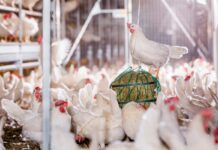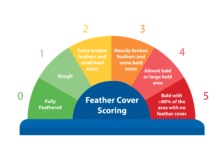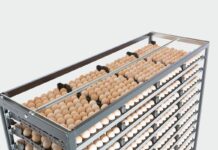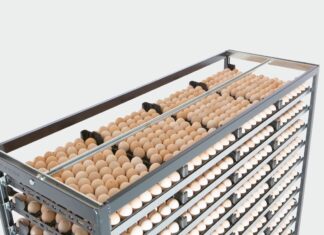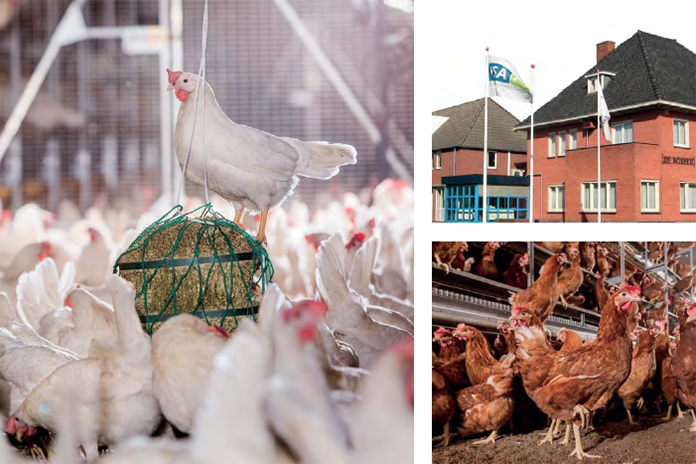
Hendrix Genetics is a leading multi-species breeding company based in Boxmeer, Netherlands-EU with their primary activities being in the layer, turkey, pig, aquaculture and traditional poultry breeding sectors. The company’s strategy is geared to being a global leader in animal selection by strengthening four key business points namely creation of value; business cooperation; innovation and sustainability. We recently interviewed Thijs Hendrix, Président and Servé Hermans, Managing Director – Hendrix Genetics.
Servé Hermans started outlining the success and goals the company has achieved in the last few years.
 “In recent years we have focussed on efficiency, sustainability, innovations and new solutions to help feeding the world. Looking forward, we need to continue to be even more efficient because in a few years time there will be almost 10 billion people to feed and world resources are limited. Basically, we have to handle this challenge in a more efficient way, using the new upcoming technology. In addition, it is important that the egg and poultry industries and all other viable correlated chains, work together to combine their efforts to determine where the new technology can be best applied. We strongly believe that further industrial evolution will result in the fusion of many different technologies and economic activities, such as electronics; computer applications; agriculture activities; machine building etc; and that is to be combined with the inter-connection of one sector with another to reach new solutions.
“In recent years we have focussed on efficiency, sustainability, innovations and new solutions to help feeding the world. Looking forward, we need to continue to be even more efficient because in a few years time there will be almost 10 billion people to feed and world resources are limited. Basically, we have to handle this challenge in a more efficient way, using the new upcoming technology. In addition, it is important that the egg and poultry industries and all other viable correlated chains, work together to combine their efforts to determine where the new technology can be best applied. We strongly believe that further industrial evolution will result in the fusion of many different technologies and economic activities, such as electronics; computer applications; agriculture activities; machine building etc; and that is to be combined with the inter-connection of one sector with another to reach new solutions.
We will have to provide animal protein as part of the diet for many people, but we also need to bring new foodstuffs to the world. The agricultural sector in which we operate has been the last to be industrialized – this process of industrialization has just started and a lot of work has still to be done.
In the Netherlands farmers are determining what is happening within the sector. They find themselves at the centre of the whole valuable food chain, but seem unable to organize their activities and establish their goals. They do exactly the same as their farming ancestors did 50 years ago, and produce without really considering what the consumers need.
This is the reason why we have all to work together in order to became more efficient and stronger and to better respond to market needs both currently and in the future.
The same concept can be applied to the European Union – ‘united we stand and divided we fall’. It is essential therefore to have common regulations for all the 28 European countries thereby speeding the process of real integration.”
Mr Hendrix continued by tracing the challenges that farmers will have to face in the next few years and future changes he envisages in the trading of food products.
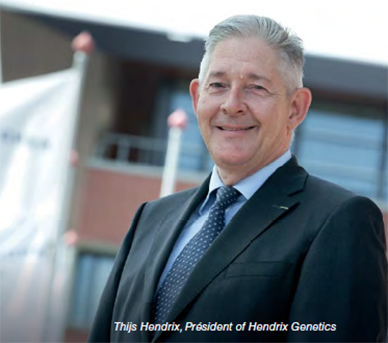 “The capitalism system is based on competition and this means we have to compete by making sure we have an advantage – but we have to ask ourselves whether this kind of competition can be sustainable for the future. Most agricultural products such as vegetables, eggs and meat are not branded and supermarkets need to take their biggest income from these non-branded products, as they hardly generate any income from A brands. It is like a spiral, supermarkets compete with each other, trying to be the cheapest and to become cheaper and cheaper means they have to purchase the non- branded products – mostly agricultural products – at the lowest price.
“The capitalism system is based on competition and this means we have to compete by making sure we have an advantage – but we have to ask ourselves whether this kind of competition can be sustainable for the future. Most agricultural products such as vegetables, eggs and meat are not branded and supermarkets need to take their biggest income from these non-branded products, as they hardly generate any income from A brands. It is like a spiral, supermarkets compete with each other, trying to be the cheapest and to become cheaper and cheaper means they have to purchase the non- branded products – mostly agricultural products – at the lowest price.
This system is now coming to an end because farmers are not making money anymore and continuity is at stake. You start seeing this especially in the northern part of Europe, where most farmers are trying to survive on their own without being organized into a food chain. The farmers cannot reduce their cost price any more and they also have to face many other issues such as animal welfare legislation. Supermarkets will have to pay more for cage-free eggs and they are seen to be changing their marketing strategy. They are moving from being a “price fighter” to becoming a supermarket that has some “ideals”. This is happening in the UK, where you find these kinds of stores, which guarantee the quality of eggs and foods by contracting directly with the producing farmers.”
Which will be your future steps to improve your business and become more sustainable?
Servé Hermans: “There are many different approaches in trying to become more efficient, profitable and sustainable. For example when we set our hatching eggs in a hatchery, we have a certain percentage of clear infertile eggs, which have to be thrown away at a cost. A company requested our clear eggs in order to use them as a substrate to produce insects, which in turn can be eaten by our day old chicks. In utilising such a practice and others we can become much more sustainable as an industry by reducing waste and adopting smart, innovative and natural solutions.
Looking at layers, we know that our birds need to have a very strong digestive system. These layer birds who produce an egg of 60 -65 gr. every day should be able to live longer and digest more ingredients. We need in turn to create a sustainable system where we can produce our birds’ feedstuffs on land, which has been fertilized using the layers’ manure and as such, create an ideal round sustainable cycle. Our layers should be fed less on maize and soya and more on local feed products so that their digestive tract will become stronger and be able to digest all kinds of by-products.
At the same time, our trading modules are moving towards further developments with the introduction of the digital marketing platforms, which are now selling food products directly to consumers. Amazon.com started some months ago selling food products and, as a consequence, a US (Seattle)-based company is entering the European Market and delivering eggs to the doorsteps of people here in Germany, France and the Netherlands.
While the trend continues for consumers to buy convenience food products in shops for consumption either at home or outside, at work or when travelling, their attitude to these products is seen to be changing. People are today more concerned about where their food is coming from and they seek out products that are produced near to home and like to know how this food is produced.
Recently we have seen that the chain-linked matrix operated by specialist organisations can be applied to any industry including those involved in food production.
At Hendrix Genetics, alongside our 5 core business units of layers, turkeys, traditional poultry, pigs and agricultural activities, we have now established a brand new innovation department with a separate organisation and budget. This department will focus on completely innovative activities, which are not directly linked to our current business. With this investments we hope to link up and use these innovations at a later date to add value to the chain of the products we are involved in.”
What is your policy towards environmental issues and to possible solutions?
Thijs Hendrix: “As far as the environment is concerned, we have to reduce the use of pharmaceuticals; chemicals; detergents and even plastics to protect the environment, while at the same time finding new solutions for a better sustainability of our industry.
We have to look for efficiency across the whole valuable food chain combining this with animal welfare and sustainability without an over-reduction of available resources.
As a company, we have introduced these concepts in the last couple of years and are working on projects and making progress in the right direction by investing heavily in this policy.In addition we remain open-minded to possible cooperation and innovation across many fields for the overall benefit of the whole poultry industry. The 4th industrial revolution that currently is emerging in every corner of the world in combination with the implementation of block-chain will help our great industry to create a new platform with a new horizon, to the benefit of all stakeholders.”


